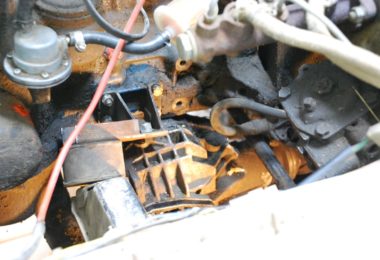A look back at our gone, but not forgotten, 1993 Lada Niva Project, originally published on 24 December 2012
The 1993 Lada Niva – сюрпризы и частей (Surprises and Parts)
First up was to tackle the broken engine mount. We scoured the self-service parts yards for Nivas and came up empty, but Shawn did find one of the Lada Signet (Riva) wagons and went to work. He came away with an engine mount, distributor, carburetor, intake manifold, exhaust manifold, various fasteners, and a fistful of the factory grey silicone vacuum hose. Lots of great items to help us get our own Lada running.

The engine mount turned out to be a mismatch, but Shawn was able to build an adapter to as use a substitute until we found a factory one. Looking over the engine we found the vacuum advance was broken and not only failing to advance the ignition timing, but was causing a huge vacuum leak. Within minutes the donor Riva advance mechanism was changed over and our distributor was repaired. This would prove to be a common trend with the Niva, lots of small problems that were easily repaired.

Since the vehicle had been stored indoors away from the cold, our efforts to start the engine were rewarded with fuel from the tank; we can only guess that the lines were frozen with condensation, blocking flow.
Once we had run out of time doing tinkering projects, we were planning on having Shawn drive the Niva a ½ kilometer home just to check everything out, but as soon as he tried to roll out of the shop we knew something was dreadfully wrong. Each time the vehicle moved forwards or back, there was an awful thumping from the driveline. With the hood open and a few bumps of the clutch, we were able to diagnose the issue, the front pinion was wrapping up into the front sway bar while the pinion yoke skipped across it, giving us our thumping sound.
We wedged a piece of wood between the engine oil pan and the front pinion to allow us to move it short distances, parked it and set down to research what could be going on.
Online resources such as Baxter’s Niva Site (http://www.ladaniva.co.uk/baxter/NivaMainPage.htm) allowed us to chase down .pdf copies of the Driver’s Handbook, Maintenance Manual, Cutaway Illustrations and a Parts Catalogue. These resources made it very clear what the issue was, and was our first experience in the overly simple nature, but quirky nature of Russian engineering.
The Front Differential bolts to the engine!
Since our Niva had been partially disassembled when we bought it, we had no idea what it should have looked like underhood, so it was an honest mistake to miss that our front differential mount was absent.

This photo from the cutaway book should help illustrate the issue, the items indicated by the red arrows, the brackets were missing and the mounting bosses were broken from the housing. This made re-installation of a factory piece very difficult, impossible without doing some aluminum welding.
We were at an impasse with how to proceed next, many owners who reported this issue simply installed another housing. However all of our searches in Canada for a replacement came up empty, aside from trying to procure another entire vehicle to strip parts from. This wasn’t something we wanted to do.
More research on the internet led us to Lada World (currently CLOSED) (www.ladaworld.com) where we were able to track down a solution.
Independent front differential support, part number 21215-10 and its item description caught my attention:
“It was originally created for the LADA Niva Diesel (fitted with the engine from PSA). The front reducer housing (Front Differential) is not able to be attached to the Diesel engine because of a different design in the engine housing, and Diesel engines are also known to vibrate with higher amplitude compared to Gasoline. The kit solved both problems.
The kit will give your front reducer housing 4 fix-points, hence a more rigid attachment to the body of the car. The old front reducer housing only has 2 fix-points (on the engine).
The kit is made with elastic sleeves (rubber) in all 4 fix-points. The old design does not use any elastic sleeves, and is just bolted straight to the engine.”
This kit eliminated the old way of doing things and moved attachment to the body, actually cradling the front differential in a somewhat normal fashion. I should note that Lada World is located in Denmark, and while I have had success shipping stuff from nearly every continent on the planet, the prospect of shipping from Europe was a bit daunting. Just as a backup, I tried a Lada parts dealer in Australia for a quote but was rebuffed with a simple declaration of “We only stock original parts” despite the fact these items are built by Autovaz and carry a Lada part number. That decided, we placed our online order at Lada World and played the waiting game.
